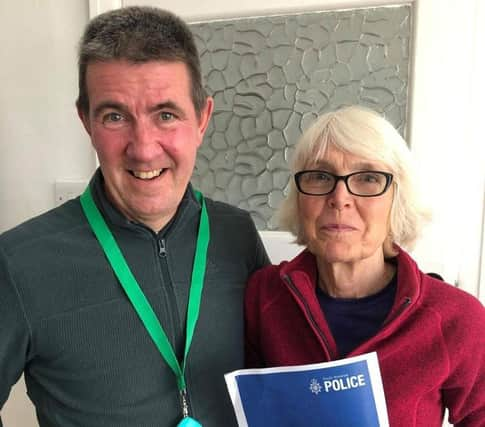Wife of Sheffield man who went missing supports police trial to provide GPS trackers for people with dementia


On October 3, a massive search operation was launched in a bid to find the man, named only as Rik, after he went missing while running a virtual marathon.
Dozens of police officers joined the search for Rik, who lives in Sheffield, but went missing at Rother Valley Country Park, near the cafe.
Advertisement
Hide AdAdvertisement
Hide AdA police aeroplane was also deployed to look for the 62-year-old who has Alzheimer’s and dementia, and drones had been sent up to try to trace him.
Rik was finally found safe and well in Beighton two days later to the great relief of his worried family.
And now with the launch of the GPS trackers, his wife Linda said they were 'more than happy' to support the trial, becoming the first people to sign up for the scheme.
Rik's wife Linda said: "I have been overwhelmed at the amount of help and support I have received from South Yorkshire Police.
Advertisement
Hide AdAdvertisement
Hide Ad"We are more than happy to support the GPS trial, not only will it be a massive benefit for Rik, but it'll remove a great deal of anxiety for me."
Police Search Advisor, PC John Porter said: "Rik's disappearance presented numerous challenges for us.
"Rik being relatively young and very physically fit meant that by the time he was reported missing there were a number of locations he could have travelled to.
"He also wasn't carrying any electrical devices so we couldn't track his movements.
Advertisement
Hide AdAdvertisement
Hide Ad"Due to his condition, Rik wouldn't have necessarily responded if someone saw him or called his name. He'd be frightened and confused, and his go-to response in that scenario would be to hide.
"We were heavily reliant on the number of resources from police and other agencies, and also the public reporting sightings."
How do the GPS trackers work?
The first of its kind, the trackers will allow families of people with dementia to have peace of mind and safeguard their loved ones.
The trackers will only be provided to family members, like Linda, with power of attorney over their loved one. The information recorded will only be available to police once they have authorised it.
Advertisement
Hide AdAdvertisement
Hide AdThe GPS devices are waterproof, and will be available as either a necklace or a keyring, designed to be discreet and comfortable.
The recipients will also receive a year's subscription to the software needed to monitor the location of the device.
The app will allow users to 'geo-fence' known locations and will send alerts if the device owner makes an unfamiliar journey, to ensure they do not become lost.
The initial trial will run for 12 months and see 50 people receive the devices. If it’s a success, this will become a permanent scheme and introduced across other police forces.
Advertisement
Hide AdAdvertisement
Hide AdPC Porter continued: “If you know someone who could benefit from the scheme, please email us for more information. We have high hopes that this will improve the lives of people living with dementia, and their loved ones.”
The team can be contacted on: [email protected].